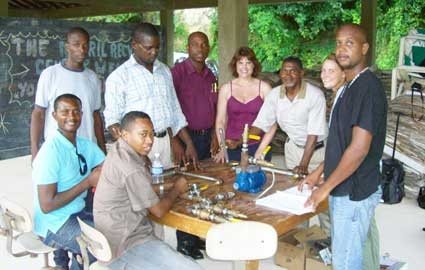ENGINEERS WITHOUT BORDERS USA
Engineers Without Borders USA assists communities while connecting those focused on sustainable engineering.

If you're considering pursuing an environmental engineering degree, Engineers Without Borders (EWB) is an organization to keep in mind for practical job experience that could give you a competitive advantage after graduation.
Engineers Without Borders USA assists communities in countries around the world while connecting engineering students and professionals who are focused on sustainable engineering. The group's goal is to design and implement engineering projects that the community in need will be able to sustain long term.
About the Program
EWB-USA helps dramatically improve the well-being of communities worldwide through projects such as providing solar-powered energy to hospitals that lacked consistent electricity, or building a bridge to safely connect a community to a local market visited weekly by thousands. To date, EWB has served nearly 250 communities that were unable to meet basic human needs, and currently connects more than 12,000 members. In 2011, the Pittsburgh chapter constructed a water pumping system in Tingo Pucara, in the Ecuadorean Andes, whose nearest source of clean water is 1,000 feet below their village.
Project Types
EWB-USA determines which projects to undertake by examining each chapter's engineering interest with community needs. Project types offered include:
- Water supply—These allow for innovation as the engineers must discover a way to design effective means of storing, distributing and finding sources of water. Most communities who receive this type of aid have never had ready access to water available to them.
- Structures—Engineers build crucial physical structures in communities that lack easy access to vital areas around them. From buildings to bridges, structure projects are designed and built by students who get hands on experience in the entire engineering process.
- Sanitation—Projects dramatically improve the well-being of each member in the community. Constructing methods of waste removal systems and latrines that can be sustained by the community aides the appearance, happiness and health of the area.
- Energy—EWB provides solutions for to communities who lack consistent electricity and fuel in necessary buildings such as hospitals. Attention is mostly focused on sustainable sources of electricity such as wind, water, and solar power.
- Agriculture—These projects look to maximize a community's ability to farm and provide food for its people. By engineering irrigation systems, greenhouses and other agriculture aides the people in the community are able to live sustainably.
- Civil works—Projects incorporate an umbrella of projects not covered by the other project types. These typically include building roads, dams, and erosion control, but can vary based on the need of a certain community.
- Information systems—Projects connect communities to the world of technology. By finding solutions to get access to computers and Internet networks, schools in the area will receive long-term benefits and the wealth of information found on the web.
How Engineering Students Benefit
Students are given invaluable and practical experience in the field of engineering by being given the chance to put to use the knowledge they've gained in the college classroom. Projects allow participants to develop a deeper understanding of each step of the engineering process—from development of an idea to execution of a project. In addition to this hands-on experience, individuals involved in the EWB-USA program become connected to a network of people who can provide knowledge, experience, and opportunities in the engineering field.
According to the U.S. Bureau of Labor Statistics' 2023 Occupational Employment Statistics, environmental engineers earn a median annual salary of $100,090. Actual salaries may vary greatly based on specialization within the field, location, years of experience and a variety of other factors. Hiring in this field is expected to grow by 6.1% through 2032, which is as fast as average.
Sources: Engineers Without Borders USA
Engineering Resources
- Engineering School Accreditation
- Getting Into Engineering School
- Careers in Engineering
- Engineering Jobs
- Engineering Salaries
- Engineering Scholarships
- Engineering Links
Engineering Degrees
- Bachelor's Degree
- Master's Degree
- Doctorate Degree
- Post-Doctorate Training
- Online Engineering Degrees
